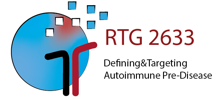A10: Exploring the role of the circadian system in autoimmune blistering disease
Background:
Epidermolysis bullosa acquisita (EBA) is a chronic autoimmune blistering skin disease characterized by autoantibodies against type VII collagen, resulting in complement activation, neutrophil infiltration, and dermal–epidermal separation. Current therapies rely mainly on systemic immunosuppressants that often show limited efficacy and severe side effects. Preliminary results from our group demonstrated that treatment with angiotensin-(1–7) [Ang-(1–7)], a peptide of the protective arm of the renin–angiotensin system (RAS), reduced disease severity in the passive EBA mouse model, suggesting potent anti-inflammatory properties.
Beyond this, previous data of the passive EBA mouse model revealed time-of-day–dependent differences in disease severity, with higher disease severity following morning induction, and altered neutrophil recruitment patterns. As immune and inflammatory processes are tightly regulated by circadian rhythms, disturbances of this internal clock system may influence disease progression and severity.
Objectives:
(i) Replication of previous findings from the passive EBA model in the active model.
(ii) Determination of the therapeutic efficacy of Ang-(1–7) in the active EBA mouse model.
(iii) Characterization of alterations in the rest–activity cycle of EBA-affected mice.
(iv) Evaluation of the potential of Ang-(1–7) to restore altered circadian rhythmicity.
(v) Investigation of correlations between immunological parameters and circadian dysregulation.
Work program active EBA mouse model:
To analyze circadian regulation, locomotor activity will be continuously recorded using Rodent Activity Detectors (RADs). Flow cytometry, qPCR, immunofluorescence staining of tissue and microscopy will characterize immune cell infiltration, cytokine expression, and molecular markers linking Ang-(1–7) treatment to both inflammatory and circadian pathways.

- Projects
- 1st Generation
- 2nd Generation
- A: Defining Autoimmune Pre-Disease
- A10: Exploring the role of the circadian system in autoimmune blistering disease
- A11: T cell memory differentiation in early autoimmune disease
- A12: Genetic and molecular similarity of autoimmune diseases
- A13: B cells as drivers towards clinical systemic lupus erythematosus manifestation
- A14: Exploring novel genetic variants and the pathogenicity of autoantibodies in patients with pemphigus vulgaris and their first-degree relatives
- A15: Investigating the role of C5aR2 in B cell functions and autoimmune diseases
- A16: Investigating the role of GPR35 in autoimmune skin inflammation
- B: Targeting of Autoimmune Pre-Disease
- Associated projects
- Medical doctoral researcher projects
- Concluded projects
- A: Defining Autoimmune Pre-Disease







